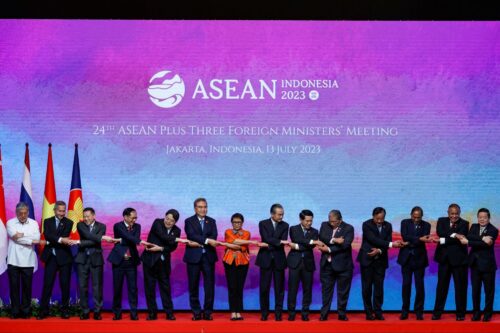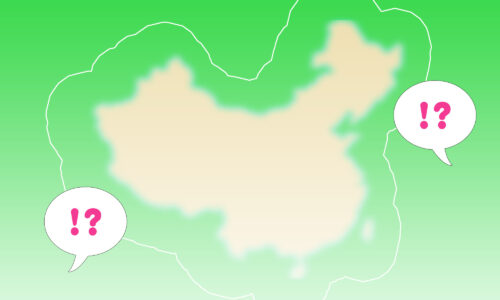News roundup: China smiles at Vietnam while consumers snap up Japanese products
Top China news for January 12, 2017. Get this daily digest delivered to your inbox by signing up at supchina.com/subscribe.

China smiles at Vietnam
Despite their cultural similarities, China and Vietnam have an uneasy, often hostile relationship that dates back more than 2,000 years. In 2014, more than 20,000 Vietnamese workers rioted and burned down Chinese-owned factories in protest against a Chinese oil rig being moved into waters of the South China Sea over which both countries claim sovereignty. Just this week, Chinese state media complained that a proposed sale by India of surface-to-air missiles to Vietnam indicated hostility. However, today, the general secretary of Vietnam’s Communist Party met with Xi Jinping in Beijing, the first foreign dignitary to visit China in 2017. State media in both countries issued bromides about friendly ties, although the Xinhua News Agency release was decidedly more effusive than Vietnam’s state media report. Wikipedia has a useful review of historical ties between the two countries; the South China Morning Post has an article on the meeting between Xi Jinping and Nguyen Phu Trong.
Ecommerce: Chinese consumers go for imported goods
Chinese ecommerce giant Alibaba has published some data on the Chinese appetite for imported goods. You can read it (in Chinese only) here. While the report is for public relations purposes, and Alibaba employs some of the slickest spin doctors in the business, its conclusions make sense:
- The online sales value of imported goods grew more than 30 percent in 2016.
- Beauty products were the most popular category, followed by food and “mother and baby” products.
- The top five countries (and favorite product categories) selling in China in 2016 were: Japanese beauty products and serums, American health foods and supplements, Korean beauty products, German milk powder and dietary supplements, and Australian health and nutrition supplements.
- The post-Brexit drop in the value of the British pound brought about a spike in sales of products from the U.K.
Today on The China Project: Sinica Podcast with Ken Liu
This week, our Sinica Podcast features an interview with science-fiction writer and translator Ken Liu on the Hugo Award–winning trilogy The Three-Body Problem (he translated two parts) and the state of science fiction in China. We also publish an excerpt from Ken’s novel The Wall of Storms.
More China stories worth your time are curated below, with the most important ones at the top of each section.
BUSINESS AND TECHNOLOGY:
- Vice chairman of Chinese insurance company taken into custody / Caixin
Sources told Caixin that Wang Yincheng, vice chairman of the People’s Insurance Company of China, was taken into custody as part of an investigation by authorities on Monday. The incident occurred following a two-month investigation by a disciplinary watchdog in late 2015, which found that the company had a series of “Party disciplinary problems,” including “ineffective management of officials who traveled abroad for personal reasons” and “officials’ relatives making money from insurance businesses.” However, the exact reason for the action is unknown. - Narrowing talent recruitment gap between local and foreign companies in China / CNBC
Recent research, conducted by Bain & Company and LinkedIn China, shows that homegrown Chinese companies are competing with multinationals “head-to-head” when it comes to recruiting top talent, salaries, and career opportunities. The report also found that Chinese nationals hold nearly 6 out of 10 regional roles within multinationals in the country, and 9 out of 10 regional roles in local firms.
- Opinion: China’s great money ball has more bubbles in sight for 2017 / Bloomberg
- China makes awkward free trade champion, experts say / Japan Times
- U.S. launches WTO complaint over Chinese aluminum subsidies / Reuters
- China’s anti-Teslas: Cheap models drive the electric car boom / Reuters
- What Central Bank? China’s big bitcoin traders are all-in on bitcoin / CoinDesk
POLITICS AND CURRENT AFFAIRS:
- China pushes back after Tillerson warns on South China Sea / Bloomberg
Rex Tillerson, Donald Trump’s nominee for U.S. secretary of state, said yesterday at his Senate confirmation hearing that China’s island-building and military equipment deployment in the South China Sea is “akin to Russia’s taking Crimea” from Ukraine. He firmly stated, “We’re going to have to send China a clear signal that first the island-building stops and second your access to those islands is also not going to be allowed.” Though Tillerson offered no details on what that clear signal may entail, Chinese analysts gave a more detailed preview of what China’s response to U.S. military action might be: even more military buildup on the islands, and an air defense identification zone. - Prominent Chinese university bans staff from criticizing Communist Party in class / SCMP
Among other things, President Xi Jinping’s administration has become known for heightened censorship and stricter ideological control over schools and universities. Today, the South China Morning Post reports that Sun Yat-sen University — named after the revolutionary who overthrew the last imperial regime a century ago, and still known as one of the more progressive or liberal campuses in China — has issued tight new censorship measures for professors. They are now banned from “criticizing the constitution,” “criticizing Chinese Communist Party leaders,” and “spreading religion and superstition.”
- Hong Kong human rights situation ‘worst since handover to China’ / The Guardian
- China says its aircraft carrier leaves Taiwan Strait / Reuters
- China launches new electronic intelligence naval ship / Reuters
SOCIETY AND CULTURE:
- NBA’s Chinese New Year bash to include jerseys, Yao Ming ceremony / ESPN
The National Basketball Association has announced that players from the Houston Rockets, Golden State Warriors, Toronto Raptors, and Washington Wizards are going to wear special uniforms to celebrate the Chinese New Year during the festivities, which run from January 27 to February 12. - Struggling Chinese school pupils given higher grades from ‘mark bank’ to avoid failing exams / SCMP
A school in Nanjing launched a “mark bank” system in order to motivate students. Children at the school can borrow points that they need to get passing grades, but they have to pay back such loans by scoring extra points on future exams. Kan Huang, the director of the school, said that “implementing the mark bank was a step in the direction of placing more emphasis on students’ growth rather than their final exam performance.”
- Service with a smile in Xi’an / WSJ (paywall)
- Government orders Chinese air quality app to limit readings / Sixth Tone
WEI WATCH:
Keep an eye on what’s buzzing among China’s 700 million social media users.
Obama speech and Trump press conference trigger contrasting responses from Chinese netizens
On Tuesday night, President Obama delivered his farewell address, talking about his accomplishments and his vision for the future. About 12 hours later, his successor, Donald Trump, held his first press conference since winning the U.S. presidential election. On the Chinese internet, comments were generally positive about Obama and negative about Trump. Typical postings included a comment that reads: “I will miss Obama for sure, especially after Trump takes office.” Another says Trump “looks silly. Not presidential at all.”





